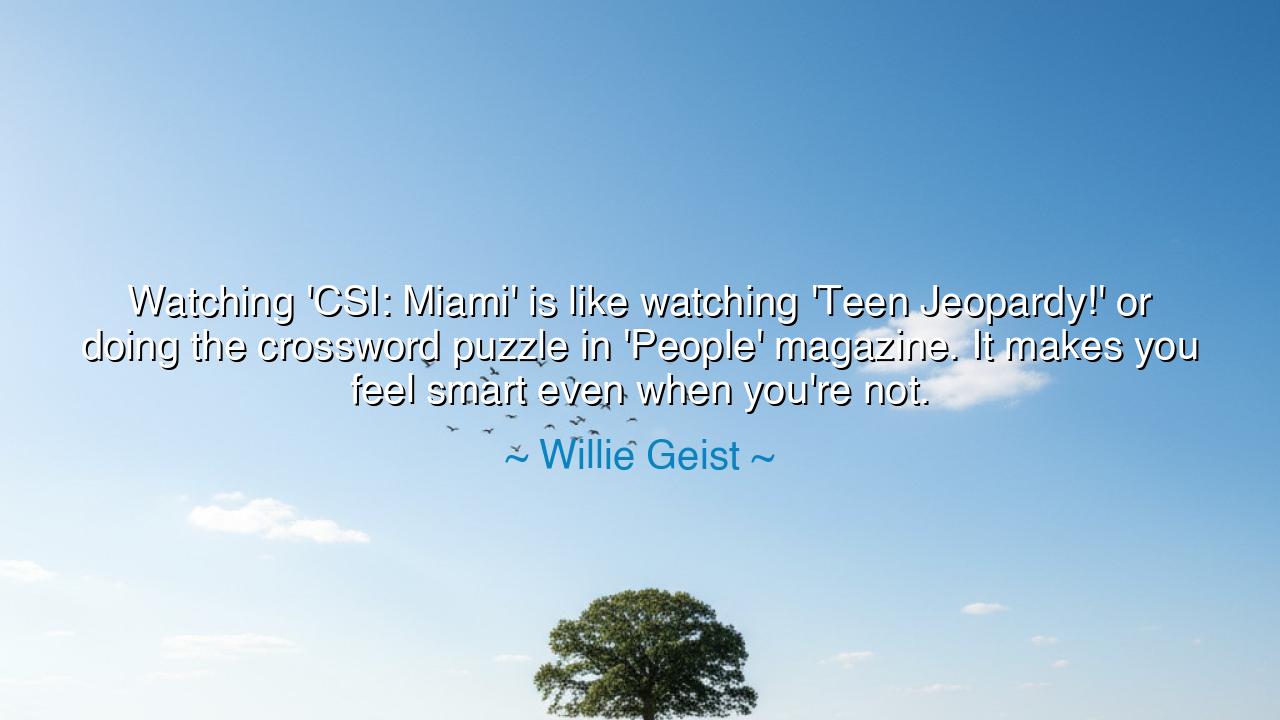
Watching 'CSI: Miami' is like watching 'Teen Jeopardy!' or doing
Watching 'CSI: Miami' is like watching 'Teen Jeopardy!' or doing the crossword puzzle in 'People' magazine. It makes you feel smart even when you're not.






Willie Geist once spoke with wit and insight: “Watching ‘CSI: Miami’ is like watching ‘Teen Jeopardy!’ or doing the crossword puzzle in ‘People’ magazine. It makes you feel smart even when you’re not.” Though lighthearted in tone, these words uncover a profound truth about human nature: our yearning to feel capable, our desire to grasp knowledge, even when the challenges before us are made simple for our comfort. Within his jest lies a reflection on the nature of perception, confidence, and the pursuit of understanding.
The meaning of this quote lies in the distinction between feeling intelligent and being truly wise. Geist compares watching a stylized crime show to solving an easy puzzle or answering youthful trivia: the mind is flattered without being tested. This is not condemnation but recognition—sometimes people crave entertainment that reassures them, rather than challenges them. It is a mirror to our vanity, for we delight in the sensation of mastery, even if the ground beneath it is shallow.
The origin of this observation is rooted in the rise of television dramas like CSI: Miami, which simplified the complexity of real-world science and justice for broad audiences. Cases are neatly tied within an hour, evidence speaks with clarity, and good triumphs over evil with cinematic flair. Unlike the labyrinth of real investigations, these shows give viewers the illusion that the truth is always within reach. Much like Teen Jeopardy!, where the questions are easier than the standard game, such programming comforts rather than confronts. Geist, with humor, points out the illusion of intelligence such experiences provide.
The ancients, too, were wary of false wisdom. Socrates himself warned against sophistry—those who dressed shallow words in the garments of truth. He declared that to believe one knows when one does not is the greatest ignorance. The easy puzzles of Geist’s analogy are like the sophists’ teachings: flattering to the ego, but not nourishing to the soul. Yet even in these, there is value, for they may awaken the appetite for deeper knowledge, much as sweet honey might prepare the palate before a meal of substance.
Consider also the story of Alexander Pope’s satire in the 18th century, who mocked shallow learning with the line: “A little learning is a dangerous thing.” He spoke of those who sip from the fountain of knowledge and believe themselves full, though they have only tasted the surface. Geist’s quip belongs to this same tradition—reminding us that the feeling of knowledge is not its possession. To stop at entertainment-level wisdom is to be satisfied with shadows when the sun awaits.
The lesson for us, then, is not to despise the simple joys of entertainment, but to recognize their place. It is good to feel capable, good to be encouraged, but we must not mistake this for true mastery. The wise know that entertainment is a spark, but diligence and study are the fire. Let the easy puzzle give you delight, but let it also remind you that harder puzzles exist, waiting for your effort, requiring patience and perseverance.
Practical wisdom follows: when you consume media that flatters your intellect, smile at it, but do not stop there. Seek out deeper learning, read difficult books, ask hard questions, and confront challenges that stretch your mind. As in physical training, muscles grow not from ease but from resistance. Likewise, the mind grows not from simple victories but from struggles that force it to expand. True wisdom lies beyond comfort.
So, children of tomorrow, take Geist’s words as both jest and teaching. Do not scorn the easy puzzles that make you feel clever, but let them be the doorway, not the destination. Seek beyond illusion, and hunger for depth. For it is better to wrestle with difficulty and grow in truth than to bask forever in false mastery. Let your mind thirst for more than the appearance of knowledge—let it strive for the substance.






AAdministratorAdministrator
Welcome, honored guests. Please leave a comment, we will respond soon